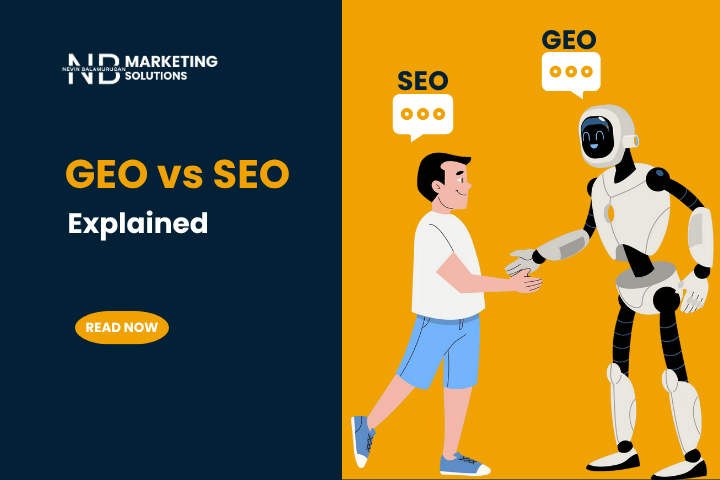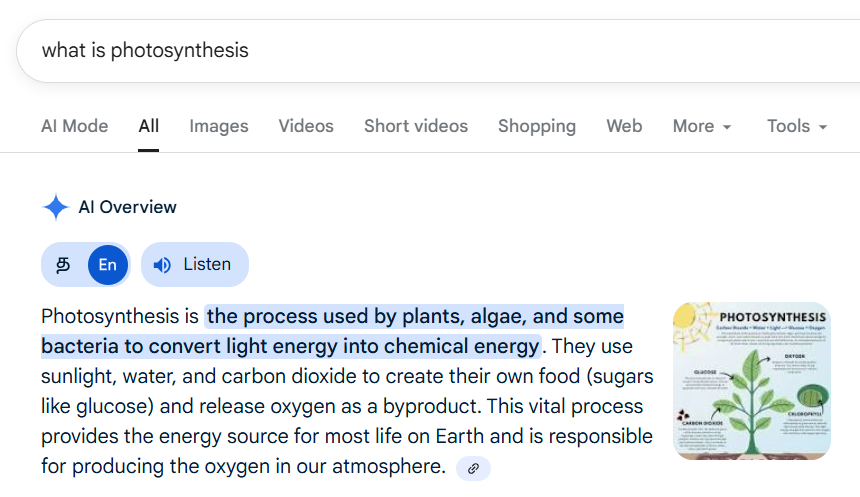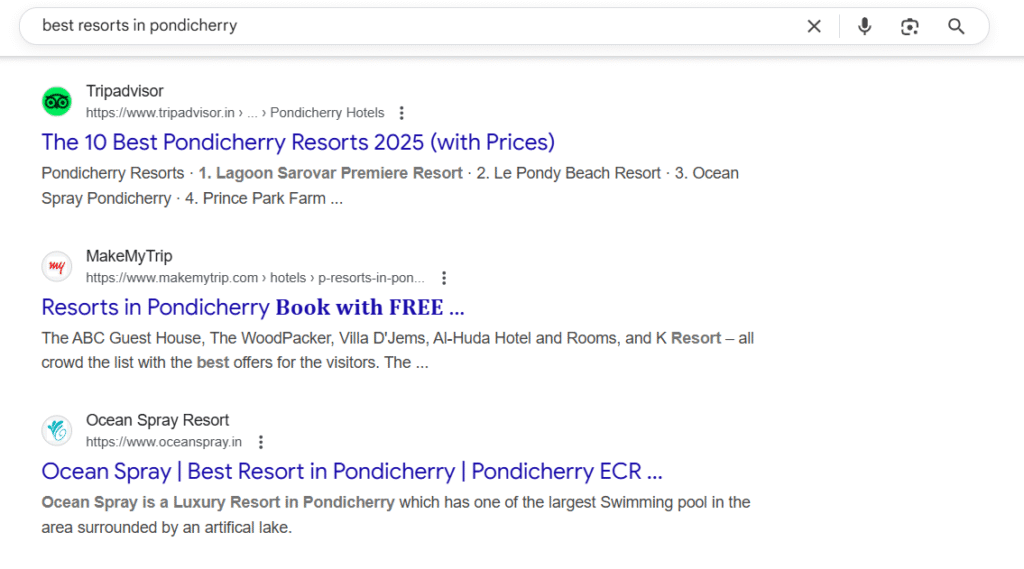GEO vs SEO: The Future of Search Optimization in 2025
Nevin Balamurugan
October 16, 2025

GEO vs SEO: How Search is Evolving in 2025?
Search is evolving. Fast. The debate between GEO vs SEO is a new topic among marketers in the digital marketing industry.
While search engine optimization (SEO) helps your website rank in Google’s search engine result pages (SERPs), generative engine optimization (GEO) helps your website get cited in AI tools like ChatGPT, Perplexity, Claude, and Google AI Overviews.
Gartner predicts traditional search volume will drop by 25% in 2026. This does not mean SEO is dead. It means you cannot treat them in the same way as before. To stay visible, you need both GEO and SEO optimization to build authority.
In this blog, you’ll understand GEO vs SEO, what it is, where they overlap and differ, and how they work together to make your brand catch customers’ eyes.

GEO vs SEO: An Overview
Generative engine optimization (GEO) is the practice of optimizing your content to appear in AI-driven platforms (ChatGPT, Perplexity, and AI Overview) that use large language models (LLMs) to generate conversational responses.

Search engine optimization (SEO) is the process of enhancing your website’s visibility to rank higher and improve your page placement in organic search engine results. It relies on your content quality, website structure, backlinks, and technical performance to earn visibility.

GEO vs SEO: What are the Similarities?
When marketers talk about GEO vs SEO, it’s easy to think they’re two completely different – one old (SEO) and one new (GEO). But both aim to make your content visible, trustworthy, and useful.
Let’s see the key similarities between GEO vs SEO.
- Focus on discoverability: Both GEO and SEO help your brand or content to be discovered by the right audience. SEO helps you appear in the top search results, whereas GEO cites your content when AI engines generate an answer.
- Quality content is crucial: Google algorithm and AI models share one common thing – high-quality content based on customer needs and preferences.
- E-E-A-T principles matter: Experience, Expertise, Authoritativeness, and Trustworthiness are crucial for both. Adding content from reliable experts, transparent resources, citations, facts, and real brand mentions builds confidence in the customer’s information.
- Structured content increases visibility: Descriptive headings, using headers (H1, H2, H3), short paragraphs, bullet points, tables, FAQs, and schema markup help crawlers understand your website content and easier for LLMs to format answers for queries.
- Technical SEO matters for both: Mobile optimization, fast page loads, internal linking, and structured URLs make content easier to discover. These features come under GEO vs SEO.
- Clear and direct answers: Using direct answers in a conversational tone performs well in featured snippets and can get more clicks to rank better in SERPs.
- Keyword still works: Search can change, but without keywords, customers cannot search for content. So, use keyword research to find better keywords – more importantly, long-tail keywords (best for blogs, videos, PPC, SEO, GEO, voice search, and so on).
- Need constant updates: Both the algorithm and AI models simultaneously change. So, you need to refresh outdated statistics, facts, expand sections, and external links that don’t help customer search.
- Multimedia performs well: Including images, videos, infographics, and screenshots clarifies customers’ complex problems. Multimedia can be visible in AI search engines, and using multimedia in a website or blog ranks better than your competitor’s sites.
GEO vs SEO: What are the Differences?
While both GEO and SEO aim to increase your brand visibility, they do so in different ways:
- Search engines differ: SEO focuses on traditional search engines like Google and Bing, while GEO focuses on AI-driven search engines like ChatGPT, Perplexity, and AI Overview that generate direct responses to customers.
- Output style: SEO shows blue links in the search results, while GEO shows AI-generated content with citations in AI search engines.
- Requires optimization: SEO is all about ranking websites in the #1 SERPs, where GEO increases brand visibility in AI-driven responses through website citations.
- Success metrics: You can measure your SEO success through metrics like page ranking, organic traffic, click-through rate, bounce rate, average time per page, and conversion. However, GEO success can be measured by mentioning your brand name and citing your content in the AI responses.
- Content structure: SEO content is structured through keyword optimization and link building, while GEO content needs to include citations, statistics, facts, and direct responses.
- Query format: SEO focuses on short or keyword-based searches, while GEO mainly focuses on longer or conversational prompts or question-based searches.
How to use GEO and SEO Together?
So, it’s no longer GEO vs SEO. It’s GEO + SEO. The best strategy isn’t choosing one; it’s how to implement both in your marketing strategy.
Here’s how you can make them work together effectively:
1. Start with a solid SEO foundation
Check out your website optimized for technical performance, strategic keyword targeting, and high-quality content that establishes topical authority. With this, you can keep your content visible and credible in traditional search results.
2. Use GEO strategies
Today, customers mostly come to search engines to solve their problems, so try to use question-based keywords. For example, when they search “How can I lose weight without exercise?”, Google’s AI Overview shows results that directly answer that question
3. Use data, statistics, and multimedia
Add schema markup where relevant and diversify your content with multimedia formats such as charts, transcripts, infographics, or short videos. Moreover, use statistics, reliable expert advice, cite reputable data resources, and facts in your content. These additions help AI systems better interpret your content so you can appear in featured snippets.
That’s all you need to do. The key difference between SEO vs GEO – SEO helps your content get discovered, while GEO includes your content in AI-driven responses. When executed together, they create a powerful synergy that boosts visibility across both traditional search engines and generative platforms.
To Keep Your Brand Visible in Both GEO and SEO – Reach Us Now!
Use both GEO and SEO strategically in 2025. SEO helps your content be discoverable on traditional search engines, while GEO positions your brand within AI-generated answers, meeting customers wherever they seek information. By combining these approaches, you create a visibility strategy that drives traffic, builds authority, and keeps your brand relevant across multiple platforms.
For businesses looking to maximize their online presence and stay visible in both SEO and GEO, reach NB Marketing Solutions now. We experts can work to make your brand stay at the top of search engines and get noticed in the AI engine. We also provide guidance to keep your brand visible, credible, and grow.
GEO vs SEO FAQs
1. What is SEO?
SEO, or Search Engine Optimization, is the practice of optimizing your website and content to rank higher on traditional search engines like Google and Bing. It focuses on improving visibility, relevance, and authority so users can easily find your content.
2. What is GEO?
GEO, or Generative Engine Optimization, is the practice of optimizing your content to appear as responses in AI-powered platforms like ChatGPT, Google’s AI Overview, or Perplexity.
3. What is the difference between GEO and SEO?
GEO (Generative Engine Optimization) focuses on optimizing content to appear in AI-generated responses, while SEO (Search Engine Optimization) aims to improve rankings on traditional search engines like Google and Bing.
4. Do I need to choose between GEO and SEO?
No, you can use both for your effective marketing strategy. SEO provides search visibility, while GEO helps your content get cited and surfaced by AI platforms.
5. How can I optimize content for GEO?
You need to include question-based keywords, structure content around real questions, use clear headings, implement schema markup, and include multimedia like videos, charts, or transcripts.
Recent Posts
Have Any Question?
- (+91) 938-542-1049
- info@nbmarketingsolutions.in
Categories
Make Appointment
Confused Over Choosing The Right Services For Your Business?
Tamil Nadu, India
- Near TMB Bank, Anjugramam post, Kanyakumari 629401
- info@nbmarketingsolutions.in
- (+91)93-8542-1049
